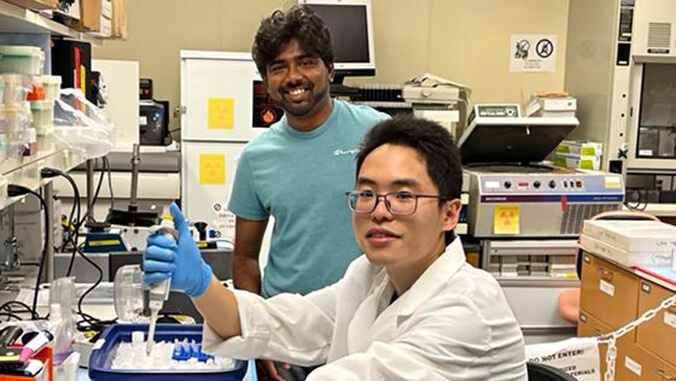
Two students from the University of Hawaiʻi at Mānoa College of Tropical Agriculture and Human Resources’ (CTAHR) Department of Human Nutrition, Food and Animal Sciences are furthering the research of their mentor.
In 2020, Associate Research Professor Andre Seale studied how fish recognize and tolerate changes in aquatic environments, such as temperature and salinity—now, in 2023, graduate student Tharindu Malintha and undergraduate student Ke Cao were given an opportunity to shine in this field.
“I’m extremely proud of these two young scientists,” said Seale. “Through their hard work and dedication, they produced impactful research while making speedy progress toward their personal and professional development.”
Malintha and Seale have also conducted research together, and their work, “Osmosensitive transcription factors in the prolactin cell of a euryhaline teleost,” appeared in Comparative Biochemistry and Physiology.
The students’ findings
Under Seale’s mentorship, Malintha found multiple transcription factors that are sensitive to ambient solute concentration. Transcription factors control multiple genes, including the one that encodes for prolactin, a hormone that in fish is important for salinity acclimation.
“Transcription factors are molecules that turn genes on and off by binding to DNA,” said Malintha, who defended his PhD dissertation with “Environmentally Sensitive Transcription Factors in the Prolactin Cell, Gill and Kidney of Mozambique Tilapia (Oreochromis mossambicus).”
Malintha added that changes in temperature can activate or inhibit similar transcription factors and characterize the molecular pathways activated in gills and kidneys when fish are in different salinities.
Furthermore, Cao has been working on a project to show how tight-junction proteins help fish cope with change. Tight-junction proteins play a key role in maintaining structural integrity between cells. When fish are challenged with rapidly changing salinities, these proteins act to prevent excessive water movement across the gill.
Cao’s project was supported by an Undergraduate Research Opportunities Program (UROP) award, and was presented at the 46th annual Albert L. Tester Memorial Symposium and the UROP undergraduate showcase.

